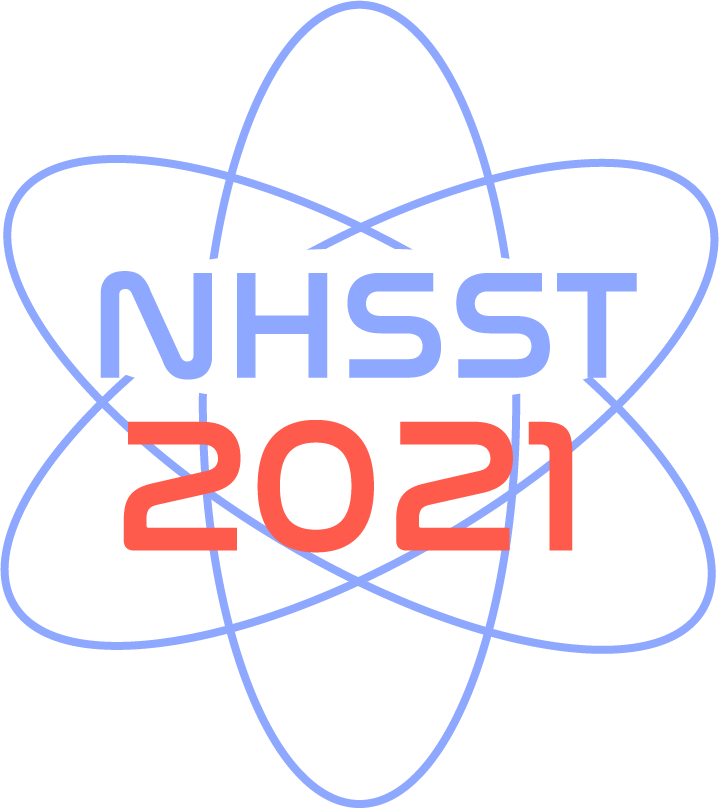National High School Science Tournament 2021
The National High School Science Tournament (NHSST) is a Quizbowl-style science competition where teams of four students race to buzz first on clues of decreasing difficulty about concepts from physics, math, chemistry, biology, astronomy, earth science, computer science, and more.
If you have any questions or concerns, please email us at nhssciencetournament@gmail.com.

Rules
These rules are current as of July 21, 2021.
Teams
- Teams may have 3-6 players, 4 of which will play at a time. Teams with under 3 players by August 5, 2021 will be dropped.
- Team members must have been in grades 8-12 in the 2020-21 school year but do not necessarily need to have attended the same school.
- Teams that provide a moderator via this form may be given precedence should the field become full.
Setup
- The competition will take place over Discord, where teams will be assigned roles and sent to their respective voice channels for each round.
- Each round will take place in a voice channel with two teams and a moderator who will read the questions and keep score.
- All players should have cameras on while questions are being read and have one hand in view at all times.
Rounds
- Each round will consist of two types of questions: tossups and bonuses.
- A round consists of 20 tossup questions.
- Tossups are pyramidal questions with clues of decreasing difficulty. All players may buzz on tossup questions.
- When a player buzzes, they will be recognized by the moderator and has 3 seconds to finish their answer. Powers (answering the question correctly on one of the first few clues) will receive 15 points while correct answers after the power mark will receive 10 points. Incorrect answers before the question has been read will result in a loss of 5 points.
- Team members may not discuss during tossup questions and only one player from each team may buzz on a given tossup.
- Competitors may buzz in within 5 seconds of the moderator finishing a tossup question.
- Teams that correctly answer a tossup question will receive a bonus question.
- Bonus questions are 3-part questions that are read to a team after they correctly answer the corresponding tossup question.
- Each bonus consists of an easy, medium, and hard part (not necessarily in that order), each worth 10 points.
- Team members may discuss during bonus questions and must direct an answer within 5 seconds of the moderator finishing the question by capitalizing it in the chat or verbally indicating that it is their final answer.
- Tossups are pyramidal questions with clues of decreasing difficulty. All players may buzz on tossup questions.
- When a player buzzes, they will be recognized by the moderator and has 3 seconds to finish their answer. Powers (answering the question correctly on one of the first few clues) will receive 15 points while correct answers after the power mark will receive 10 points. Incorrect answers before the question has been read will result in a loss of 5 points.
- Team members may not discuss during tossup questions and only one player from each team may buzz on a given tossup.
- Competitors may buzz in within 5 seconds of the moderator finishing a tossup question.
- Bonus questions are 3-part questions that are read to a team after they correctly answer the corresponding tossup question.
- Each bonus consists of an easy, medium, and hard part (not necessarily in that order), each worth 10 points.
- Team members may discuss during bonus questions and must direct an answer within 5 seconds of the moderator finishing the question by capitalizing it in the chat or verbally indicating that it is their final answer.
Miscellaneous
- Teams may choose to protest a question if they deem its content to be inaccurate or the moderator’s ruling on their answer to be unfair. Protests will only be considered if they affect the overall result of the round. Excessive protests may be denied at the moderator's discretion.
- Because of latency, different people may see different orders of buzzes on their screens, which affects which player has buzzed first. The order on the moderator’s screen will be taken as the official one in this case.
Topics
NHSST questions will cover several areas of science as in Quizbowl, but will consist of only science questions to give students interested in Science Bowl or the science aspect of Quizbowl a chance to show off their skills.
- Each round will consist of a specific distribution of science subjects, where the corresponding number represents the number of tossup-bonus pairs for that subject in each round.
- Physics (3)
- Math (3)
- Chemistry (3)
- Biology (3)
- Astronomy (2)
- Earth Science (2)
- Computer Science (1)
- General Science (3)
- Tossups and bonuses may be either computational or theoretical. Computational questions will be preceded by the words "Paper and pencil ready."
- Question difficulty will be slightly harder than Quizbowl HS Regs difficulty. Packets marked with a (2) on quizbowlpackets.com are examples of HS Regs difficulty, and teams can practice by reading the science questions from those packets.
- Physics (3)
- Math (3)
- Chemistry (3)
- Biology (3)
- Astronomy (2)
- Earth Science (2)
- Computer Science (1)
- General Science (3)